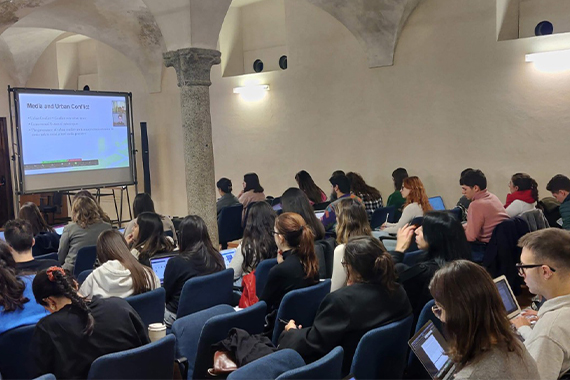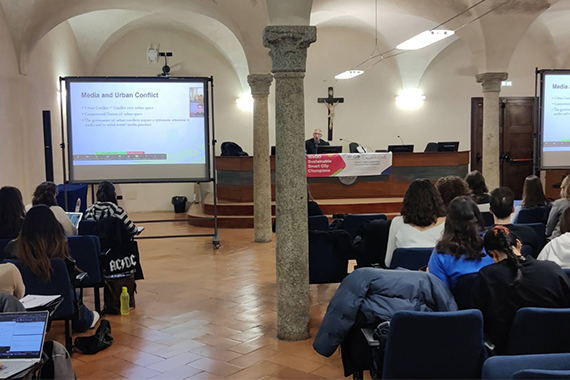WeGO Champions Navigate Conflict, Media, and Identity in Smart Cities in Milan
On November 14, 2023, the WeGO Sustainable Smart City Champions held its fifth in-person workshop series Young Urban Leadership: Perspectives in Dialogue in the Catholic University of Milan. The workshop garnered substantial attendance, with 47 students participating in a thoughtful discussion with esteemed professors. The focal point of the event was the topic of “Redefining Urban Communication: Conflict, Culture, and Digital Media in Smart and Sustainable Cities.”
Respected professors Dr. Matteo Tarantino (Catholic University of Milan), Dr. Simone Tosoni (Catholic University of Milan), and Dr. Zlatan Krajina (Zagreb University, Croatia) shared their expertise in different aspects of urban development communication. Dr. Tarantino specializes in Data, Information & Society and Information and Communication Systems. Dr. Simone Tosoni’s field is media studies connected to Sustainable Development Goals (SDGs). Dr. Krajina’s field of focus on the other hand, is media cities, media audiences, and qualitative methodologies.
Starting the lecture focusing on how digital technology has reshaped the way cities communicate their identity, Dr. Tarantino discussed how smart cities leverage technology to market themselves and establish their unique urban personas. It was a short introduction on the role of a city’s digital transformation on a city’s branding processes. Dr. Tosoni introduced the concept of “Media Territories” for the WeGO Champions to get a better understanding on the topic of urban conflict and the role media plays when such conflicts happen. He explored how urban communication is a multi-stakeholder endeavor, making it naturally susceptible to potential conflict. The students also learned that social media can be instrumental in forwarding the social stances of different groups. “We’ve got to understand where all the social actors are communicating, also map all the social actors involved in a conflict and then check their media territories,” said Dr. Tosoni.
To get a better understanding on the topic, Dr. Tosoni used the 2007 riots in the neighborhood of Paolo Sarpi that involved Chinese migrants in Milan and its Italian residents. Through the example, the professor successfully illustrated the role of representations and misrepresentations in the rise and governance of urban conflict.
Then, Professor Krajina presented his work on the materiality of media cities and how screen presence in our everyday environment can relate to conflict. He developed on how social media was instrumental to reporting hate assaults during the Brexit referendum of 2016 and is key to developing the “electronic presence.” He concluded with some key elements to integrate these aspects in the future of policymaking, such as the importance of public encounters, the potential of the public sphere in the urban space and non-visual urban communication. He also reminded the students of the communication process’ subjectivity nature.
“Media cities are spaces where a lot of communication happens in different ways, and these are spaces where communication is encouraged.” said Professor Krajina in the lecture. By making these Brexit-related conflicts known online, viewers now have the capacity and the power to protect themselves from being a part of a similar narrative happening in the city they inhabit. As the participants of the offline dialogue are young and active online themselves, it sparked a discussion on how they could be a part of the solution when something similar happens.
Next, the controversial Milan neighborhood of Paolo Sarpi (colloquially known as Milan’s Chinatown”) was introduced to the Champions. The Paolo Sarpi’s neighborhood has faced spatial conflicts rooted from its Italian residents and Chinese immigrants who are business owners in the area. The conflict was impacted by the multiple stakeholders involved, especially the storytelling capacities of the media.
The students got immersed in the discussion of the interplay between communication, physical space, and social tensions drawing on Dr. Tosoni’s lecture on the neighborhood’s 15-year longitudinal study. The study was detailed in the lecture, and students get to learn how urban processes and media mutually shape each other. The research paper on this can be accessed here.
About WeGO
The World Smart Sustainable Cities Organization (WeGO), is a membership-based international association of local governments, smart tech solution providers, and institutions committed to the transformation of cities into smart sustainable cities through facilitating public-private partnerships (PPP). WeGO was founded by 50 member cities in 2010 as the World e-Governments Organization, hence our acronym. In response to the evolving concept of smart cities, WeGO expanded its vision and mandate at the 7th General Assembly (2017) and its name to the World Smart Sustainable Cities Organization. WeGO’s Secretariat is based in Seoul, Korea, and has regional offices in East Asia (Chengdu, China), the Mediterranean (Beyoglu, Turkey), Africa (Abuja, Nigeria), Middle East & North Africa (Abu Dhabi, United Arab Emirates), Latin America (Cuenca, Ecuador), and Central Asia (Almaty, Kazakhstan). As the leading platform on smart city development, WeGO’s mission is to share knowledge and good practices in e-Governance; strengthen administrative efficiency and transparency; advance digital capacity; facilitate civic involvement; bridge the digital divide and inequality; and promote cooperation solidarity among cities and local governments around the world.
WeGO serves for its members as their international platform to improve the quality of life, innovate in the delivery of public services, and strengthen regional competitiveness.
Press Contact:
Name: Jin Hwang
E-mail: jin.hwang@we-gov.org
Phone: 02-720-9231




